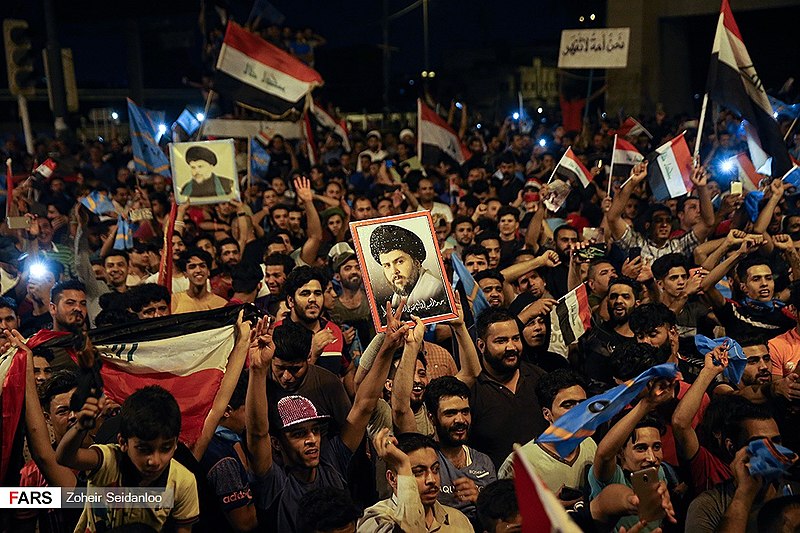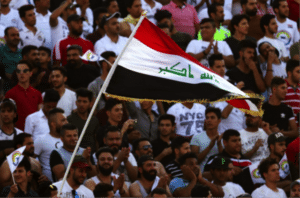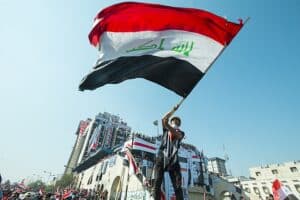Iraqi protesters hold images of popular cleric Muqtada al-Sadr during a 2018 demonstration (source: WikiMedia Commons)
Amid public outcries to finally form a new government, the Sadrist bloc now leaves the coalition-making process to its major Iran-affiliated oppositional rivals. The move by last October’s election biggest winner Muqtada al-Sadr surely postpones the formation of a new government and election of a president and PM. Meanwhile Iraq’s parliament continues its work through simple majority votes, causing government formation not to be a top priority for most of last October’s winners.
Deadlock
Iraqi parliament is divided into two opposing factions: the Saving the Homeland alliance (SH) and the Coordination Framework (CF). SH consists of the the Shiite Sadrist movement, the Kurdistan Democratic Party (KDP) and the Sunni Taqadoom party. The CF includes the Shia State of Law and Fatah alliances, as well as some small Sunni parties and the Patriotic Union of Kurdistan.
While the election of a President and PM needs a two-third majority in Iraqi parliament, regular legislature does not. The Sunni Taqadoom party of speaker Mohamed al-Halbousi and Kurdish KDP party have a simple majority with Sadr’s party, meaning they can pass much-needed legislature on socio-economic support and budget measures. They have 186 seats, while 166 are needed.
Currently, Iraqi parliament have not agreed on its annual budget. Without one, governmental expenditure will soon halt and social welfare programs falter. Sadr and his allies have now submitted a “mini budget” that will tackle most problems in the upcoming months without the need of approving an annual budget. The current Iraqi government with PM Mustafa al-Kadhimi is entrusted by the SH, and he will stay on for the time to come to guide these policies.
“We will not allow the country to be held hostage. We will implement the constitution, and the constitution says that there is a legally recognised parliament, a parliament speaker, a president, a prime minister and a government,” a prominent Sadrist leader said.
“Practically, there will be no problem if a new government is not formed for another few months. We have a parliament and a government, which will both carry out their duties without any trouble.”
Frustrating the CF
Through its present political tactic, SH heavily impedes the CF. In its current set-up, they breach with the political culture of consensus-governing, the conventional mode of government in Iraq since 2003. Sadr has given the Coordination Framework the initiative in finding majorities and possibly electing a new president. However, this is currently not possible – in the meantime, the SH can keep governing Iraq without a formal coalition.
“Sadr is not in a hurry to form a government. Keeping the current situation as it is for six months or a year is one of the solutions now being strongly proposed,” a prominent leader of Sadr’s Save the Homeland alliance, who is close to KDP leader Masoud Barzani, said.
However, the current situation remains politically instable. Various parties in Iraq are affiliated with armed factions. These have earlier tried to influence politics extra-parliamentary with various forms of violence.
Political standstill is the expectation for the months to come. The international community aids Iraq significantly, especially through some major western donors. It is crucial that these will keep pushing for the formation of a stable, legitimate government in the country – as the current situation will not offer any long-term solution to Iraq’s turbulent domestic political and socio-economic situation.
Sources: Al Monitor I Middle East Eye Al Monitor II
Photo: WikiMedia Commons



